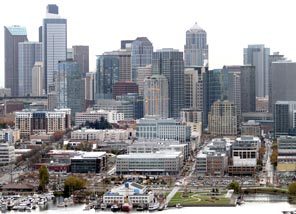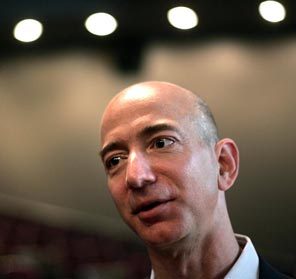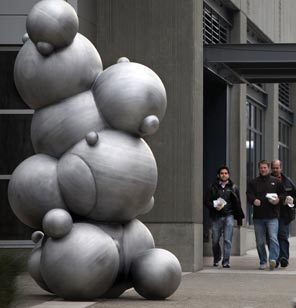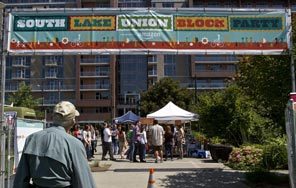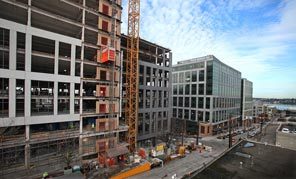Originally published March 31, 2012 at 10:45 PM | Page modified April 5, 2012 at 10:16 AM
Amazon a virtual no-show in hometown philanthropy
The world's biggest online retailer is a minor player — at best — in local charitable giving.
Seattle Times business reporters
AARON JAFFE / THE SEATTLE TIMES
South Lake Union's old, low-slung warehouses have given way to modern, high-tech offices. In this aerial view, Amazon's campus rises at center between Lake Union and downtown Seattle's skyscrapers, but you won't find the Amazon name on any of the buildings. Company representatives didn't even show up for the campus groundbreaking.
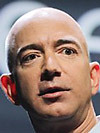
Jeff Bezos founded Amazon.com.
JOHN LOK / THE SEATTLE TIMES
"Our core business activities are probably the most important thing we do to contribute, as well as our employment in the area." — Jeff Bezos
STEVE RINGMAN / THE SEATTLE TIMES
Vulcan Real Estate commissioned three aluminum sculptures by University of Washington professor Jamie Walker, including "Beacon," above, for a plaza at the Amazon campus. Foot traffic in South Lake Union has skyrocketed since the campus opened.
DEAN RUTZ / THE SEATTLE TIMES
For such a big company, Amazon's civic contributions are relatively tiny, but they're important to small organizations. Amazon co-sponsored last year's South Lake Union Block Party and has given local writers groups grants of about $25,000 each.
ERIKA SCHULTZ / THE SEATTLE TIMES
Author Wendy Call leads a workshop at the Port Townsend Writers' Conference last summer.
STEVE RINGMAN / THE SEATTLE TIMES
Amazon's newest building is nearing completion, joining its neighbors along Boren Avenue North. Lake Union is in the distance, at right. Most of the campus sits on blocks once occupied by light industry and parking lots. The developer preserved some distinctive brick buildings.
Timeline: How the fortunes of Amazon and Jeff Bezos have grown
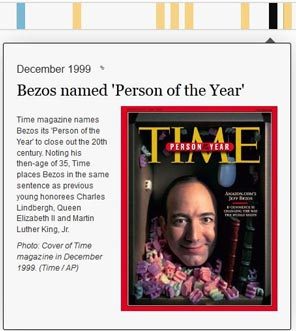
Click on the image above to explore a timeline about Amazon and its founder, Jeff Bezos.
Part 1: Behind the smile in Seattle
Part 2: A hammer on the publishers
Part 3: Pushing back on sales taxes
Part 4: Worked over in the warehouse
From the editor
![]()
Last year, amid a troubled economy, United Way of King County said it received record donations from some of the area's largest companies.
Microsoft made a corporate donation of $4 million. Boeing gave $3.1 million. Nordstrom, nearly $320,000.
And Amazon.com? Zero.
Conceived on Wall Street, born in a Bellevue rental house, and based in a dozen buildings on the northern edge of downtown Seattle, Amazon has grown into one of the Internet's most-recognized name brands and a company so big that it holds staff meetings at KeyArena.
Its value in the stock market alone puts it ahead of Boeing and second only to Microsoft in the Northwest.
But as Amazon prepares to turn 18 this summer, it cuts an astoundingly low profile in the civic life of its hometown.
It's a minor player in local charitable giving. Some nonprofit officials say it can be difficult to find someone at Amazon to even talk with them. Other business leaders say they're hard-pressed to name examples of Amazon playing a significant role on broader public issues.
And while Amazon's logo smile appears on billions of boxes that crisscross the globe, neither that smile nor its name can be seen on a single building at its sprawling new campus in South Lake Union. The company won't even acknowledge how many employees it has in the area.
When the Puget Sound Business Journal named Amazon founder and Chief Executive Jeff Bezos "Executive of the Year," he was a no-show at a January 2011 luncheon to honor him.
Larry Dohrs, vice president of Newground Social Investment, a Seattle-based firm that is pushing Amazon to disclose more information about its political spending, said Amazon's leaders "have a tendency to want to consider themselves a startup in a garage, when in fact they're not a startup in a garage anymore."
"They're really quite a mature and influential player. And with maturity and influence comes responsibility."
Jan Drago, a former member of both the Seattle City Council and the Metropolitan King County Council, was blunter. "I think it's fair to suggest that they take a bigger role in the civic life of their home."
No significant donations
In a city noted for its big-time philanthropy, Amazon has been a small-time donor.
Though Amazon is a Fortune 500 company, you won't find the company's name on the rosters of major donors to such venerable local nonprofits as the Alliance for Education, Seattle Art Museum and United Way.
The Seattle Times also found no record of significant Amazon donations to the Seattle Symphony, Washington's Special Olympics, YMCA of Greater Seattle or Forterra, a prominent conservation group formerly called the Cascade Land Conservancy.
Jan Levy, executive director of Leadership Tomorrow, which teaches civic leadership skills, says that while some Amazon employees have gone through her training program, they told her they covered their own costs.
"That's unusual. Most large corporations pay for their participants' tuition," she said. "My colleagues in the nonprofit community have made similar comments about Amazon — they're noticeably absent from civic involvement."
Since 2009, Amazon has helped some 80 writers groups in the U.S., including 19 in the Puget Sound region, with grants of about $25,000, and it gave the University of Washington $51,000 over a three-year period.
But critics note that Amazon's support of writers groups coincides with the growth of its publishing business.
And besides, they say, these are small sums for a company with a cash pile of $5 billion and more than $1,500 in sales every second.
Given its large physical footprint, Amazon is seen as an anomaly among major employers for its reluctance to get involved in local matters.
It does not, for example, belong to the Washington Roundtable, a group of corporate executives focused on education and transportation issues. Although Amazon recently endorsed Washington's gay-marriage legislation, it did so only after Microsoft and other prominent Northwest companies came out in support.
Last year, for the first time, an Amazon executive joined the boards of the Seattle Metropolitan Chamber of Commerce and Downtown Seattle Association, but he has since left the company.
"Now that they're a major neighborhood presence, they have a lot of employees for whom the quality of that neighborhood is going to be important," said Kate Joncas, president of the Downtown Seattle Association.
Indeed, Amazon leases more office space downtown than any other private-sector employer, according to estimates by local real-estate experts.
Amazon will have enough space downtown for more than 10,000 employees when its South Lake Union campus is finished next year. And after tentatively agreeing to buy three blocks in the Denny Triangle, it plans a new high-rise office complex that, at 3.3 million square feet, would be the largest development ever proposed downtown.
Giant, silent neighbor
Last year, when Seattle nonprofit One Reel sought to raise $500,000 for a popular Fourth of July fireworks show over Lake Union, organizers reached out to the neighborhood's biggest newcomer for a donation.
Aubbie Beal said Amazon never got back to her with a "yes" or "no."
At Microsoft and Boeing, philanthropy is a more integrated part of the culture.
Microsoft matches employees' charitable donations and pays nonprofits $17 for every hour that they let a Microsoft employee volunteer for them. Boeing sponsors an annual "Global Day of Service" and covers the administrative costs of community funds owned and managed by its employees.
Barbara Dingfield, who helped develop Microsoft's philanthropic programs as its director of community affairs from 1994 to 1999, recalls that as the Redmond technology giant became increasingly successful, "it realized it had a responsibility to give back to the community."
"Amazon is a bit of a black box for all of us," said Dingfield, now a Seattle philanthropy consultant. "I've not seen much from them in terms of sponsorships, matching grants or employee volunteer programs."
Several current and former Amazon employees said they have wanted to change the company culture to encourage more giving. But colleagues told them not to bother — they'd be better off figuring out how to do good on their own.
"I kind of tested the waters by asking around and I got a sense it's not worth pursuing," Kintan Brahmbhatt, head of products for Amazon's IMDb Everywhere initiative, recalled last year.
So Brahmbhatt, who came to Amazon from Microsoft and donates time and money to fight poverty in developing countries, decided to help nonprofits directly.
He asked about arranging to have charitable donations automatically deducted from his paychecks. But he learned that employees who do paycheck donations are charged a 6 percent fee from a company that processes them for Amazon.
Bezos questions philanthropy
Bezos declined repeated requests for interviews for this story, and Amazon did not make other executives available.
After last summer's annual shareholder meeting, where Drago, the former city and county council member, quizzed Bezos about his company's community involvement, he made clear that he believes Amazon can do the most good by doing good business.
"Our core business activities are probably the most important thing we do to contribute, as well as our employment in the area," Bezos told The Times.
In a 2010 interview with PBS' Charlie Rose, Bezos expressed doubt that philanthropy was the best way to solve social problems.
"I'm convinced that in many cases, for-profit models improve the world more than philanthropy models, if they can be made to work."
He noted that Amazon's e-book reader, the Kindle, might be seen as a low-cost, efficient way to distribute books worldwide to the underserved.
In many ways, Amazon's culture is shaped by Bezos' beliefs and background.
Bezos, 48, grew up in a family that valued self-reliance. His father fled Cuba as a boy. And Jeff Bezos spent his childhood summers laying pipe, vaccinating cattle and fixing windmills on his grandfather's South Texas ranch.
In 1994, he was working for a New York City hedge fund when he learned about the rapid growth in Internet use and quit his well-paying job to start Amazon in a small Bellevue house. Under a then-new U.S. Supreme Court ruling, online retailers don't have to collect sales taxes in states where they lack a physical presence, so Washington's small population appealed to him.
"He wanted a majority of his customers to not have to pay sales tax," said early Amazon investor Nick Hanauer, co-founder of Seattle venture-capital firm Second Avenue Partners.
Hanauer and others who know Bezos describe him as a libertarian. In 2010, Bezos contributed $100,000 to help defeat Initiative 1098, which sought to impose a state income tax on Washington's wealthiest residents.
"There's almost nothing I could have predicted with more precision than that Jeff would hate the idea," said Hanauer, an advocate for I-1098. "He's a libertarian, and I am not."
Unlike Amazon, Bezos and family members have begun to make large, high-profile personal donations.
Bezos, who ranks 13th on Forbes' list of the wealthiest Americans, donated $10 million in August for an innovation center at Seattle's Museum of History & Industry, followed by $15 million in December to his alma mater to establish the Bezos Center for Neural Circuit Dynamics at the Princeton Neuroscience Institute.
Two years earlier, the Bezos Family Foundation, his parents' nonprofit, pledged $10 million to the Fred Hutchinson Cancer Research Center.
Amazon, by contrast, makes its philanthropic mark not by giving cash, but by "letting charities use its technology to raise money," said Stacy Palmer, editor of the Chronicle of Philanthropy.
In 2001, within days of the Sept. 11 attacks, Amazon set aside space on its homepage for customers to make Red Cross Donations. In total, the company says, customers have donated more than $35 million to global relief programs since then.
"That's helpful, but it's not the same things as a company making lots of grants," Palmer said. "Charities need a mix of things."
She compares Bezos to the late Apple co-founder Steve Jobs.
"It's not just that Steve Jobs didn't publicly give away money. But also, some of the comments he made suggested he was skeptical of philanthropy," Palmer said. "He saw Apple's products as improving society and making a difference. And it's only now (that Jobs is gone) that Apple is offering matching grants."
Gates, in contrast
Less than a mile from Amazon's headquarters lies one of the world's largest philanthropic organizations, the Bill & Melinda Gates Foundation.
Microsoft co-founder and Chairman Bill Gates, who was criticized early on for not being involved in the community, is outspoken these days on the notion that companies benefit if they make giving back to society part of their mission. Not only is it a great way to stand out and be noticed, he says, but it also helps in hiring talented workers.
"People today — especially young people — want to work for organizations they feel good about," Gates said last year at an event organized by the United Way.
But Gates' philosophy isn't shared by all. Paul Schervish, director of Boston College's Center on Wealth and Philanthropy, says much of today's corporate philanthropy is mere marketing — so common that it doesn't help a company stand out.
"Philanthropy for a corporation is not necessarily the most moral or important thing to do with your time, talent and treasure," Schervish said.
He says that people running companies can show their moral standing in other ways, such as behaving responsibly toward employees, customers and suppliers, paying taxes and complying with laws.
But increasingly, Amazon has come under fire in many of those areas.
Branded a tax bully by critics, Amazon faces political battles around the country over its efforts to avoid collecting sales taxes on purchases made on its website — a key competitive edge against bricks-and-mortar retailers.
Since 2008, more than a dozen states, including California, New York, Illinois and Texas, have enacted or considered laws to end tax-free sales online. Amazon fought back with lawsuits or threats of shutting down warehouses, but it has begun to cut deals with states to start collecting those taxes.
Amazon also received a public-relations black eye over conditions at some of its warehouses, which employ thousands of blue-collar workers.
A Pennsylvania newspaper found that ambulances were parked outside an Allentown-area warehouse last summer, waiting to take away workers who wilted in the 100-degree-plus temperatures inside.
And it caused something of a furor when the company offered a $5 holiday discount to shoppers who used its mobile app to scan products in local stores and then buy them from Amazon instead. Sen. Olympia Snowe, R-Maine, denounced the December promotion as "an attack on Main Street businesses."
Dohrs, of Newground Social Investment, argues that Amazon could provoke a backlash by customers and even some employees if it doesn't change its ways.
"When you get big, you run the risk of being arrogant. And boy, everybody loves bringing down the arrogant guy," Dohrs said.
Evidence of a backlash might already be emerging. Working Washington, a new coalition founded by the Service Employees International Union, has launched a months-long campaign to draw public scrutiny to the company's labor practices and tax policies.
Activists appeared last week at a local Design Review Board meeting where officials discussed Amazon's proposal for new office buildings in the Denny Triangle.
"The more they're talked about as a model for the future of Seattle, we have a responsibility to say, 'What does that actually mean for the people who work for them and the places where they do business?' " said Sage Wilson, a Working Washington spokesman.
Where is Amazon?
In 2009, the construction of Amazon's South Lake Union headquarters was considered a pivotal event in Seattle's history. Amazon not only would change the physical face of the neighborhood, said then-Mayor Greg Nickels, but it also represented a new economic hope for the city in the midst of the Great Recession.
The official groundbreaking ceremony, on a bright April morning, drew the mayor and the governor. Notably missing were Bezos or any other Amazon executives.
It wasn't the first or last time that people in the community would be left wondering: Where is Amazon?
"I'm not aware of what Amazon does in the community. It's not a name that comes up often in the nonprofit organizations I'm involved with," said UW regent Sally Jewell, chief executive of Kent-based outdoor-gear retailer REI.
Today, the startup mindset is cited most often by Amazon defenders as the reason for the company's small civic footprint: Just as Microsoft needed time to figure out its role as a corporate citizen, so, too, does Amazon.
While its new headquarters has not a single "Amazon" sign on the outside, it does have buildings "Day 1 North" and "Day 1 South," named after the mantra that "it's always day one at Amazon."
"When you have 50 or 100 percent annualized growth rates, there's just an infinite amount of work to do to keep the thing from exploding," Hanauer said. "It requires a lot of intensity and commitment that doesn't permit a lot of other things."
Amazon supporters also note that the company runs on tighter profit margins than many of its tech rivals, including Microsoft.
"They are investing in growing the business, and in finding their way," said Ed Lazowska, who holds the Bill & Melinda Gates Chair in Computer Science and Engineering at the University of Washington.
"There is very little margin for error. The slightest miscalculation and they crash and burn."
Recently the company has been seen taking some steps toward greater involvement in its hometown.
In January, Amazon pledged to establish two, $1 million endowed professorships at UW to help the computer-science department lure a pair of "superstars" in machine learning, and Bezos "personally spent time with them" in Seattle, Lazowska told The Times last week. He said the deal evaporates if the two professors don't come to UW. In the past year — as The Seattle Times began looking into its charitable giving and shortly after Drago questioned Bezos at the company's annual shareholder meeting — Amazon reached out to more than 30 local nonprofits, offering volunteers, in-kind donations and small, often unsolicited, cash contributions.
Amazon gave between $1,000 and $10,000 to a wide array of local nonprofits, from the Pike Place Market Foundation to the Rainier Valley Food Bank.
"It was kind of out of the blue," said Jennifer Watkins, public-relations manager at Seattle Children's Theatre, which received $2,500 from Amazon in September. "Our development department had written to Amazon asking for support and was denied. So when this showed up, everyone was pleasantly surprised."
Last August, the company chipped in $10,000 to sponsor the South Lake Union Block Party, a fundraiser for two local charities, YouthCare and FareStart. Amazon representatives handed out fliers under a tent to recruit technology workers, touting the company's "beautiful, eco-conscious, dog-friendly campus" and data-driven culture.
"We all knew they were there, but you didn't see people from Amazon at meetings about community issues" until recently, said Joncas, of the Downtown Seattle Association. "They were busy just doing business."
Seattle Times staff researcher David Turim contributed to this story.
Amy Martinez: 206-464-2923 or amartinez@seattletimes.com







